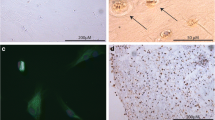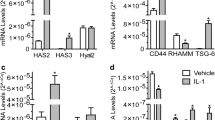Abstract:
Objective and Design: To assess the effects of glucocorticoids on the expression of multiple matrix-related genes in normal and cytokine-treated cultured equine articular chondrocytes in a phenotypically correct suspension culture.¶Material or Subjects: Articular cartilage harvested from the joints of 15 foals, 7 yearling horses, and 16 adult horses.¶Treatment: Glucocorticoids (dexamethasone, prednisolone, triamcinolone) at 10–10 to 10–4 M.¶Methods: Equine articular chondrocytes maintained in suspension cultures were treated with glucocorticoids with and without human recombinant interleukin 1-β (IL1-β) and tumor necrosis factor-α (TNF-α). Northern blots of total RNA from the treated cells were probed with equine specific cDNA probes for a number of cartilage matrix-related genes. Zymography, Western blotting, and fluorography were also performed to study the effects on protein synthesis. Results: The glucocorticoids, dexamethasone, triamcinolone, and prednisolone, markedly decreased MMP1, MMP3, MMP13, TIMP1, and ferritin steady-state mRNA levels. There were no qualitative differences seen among the tested corticosteroids although dexamethasone and triamcinolone appeared to be slightly more potent than prednisolone. The effects of the glucocorticoids on MMP transcription occurred consistently at lower doses than those required to similarly downregulate type II collagen and aggrecan. Link protein and fibronectin mRNA were increased by the glucocorticoids, and biglycan and decorin were minimally affected. Fluorography of [14-C] proline-labeled media demonstrated that the decrease in type II collagen transcription (mRNA levels) was paralleled at the protein level. Zymography and Western blotting confirmed the decrease in functional metalloproteinases found in chondrocyte cultures following glucocorticoid treatment.¶Conclusions: The effects of glucocorticoids are complex inasmuch as they differentially affect numerous genes involved in the composition of cartilage matrix and the degradation of that matrix. This study provides new insight into the effects of glucocorticoids on the regulation of extracellular matrix and matrix-related genes by demonstrating that low doses of glucocorticoids can inhibit the degradative metalloproteinases with minimal negative effects on the transcription of extracellular matrix genes.
Similar content being viewed by others
Author information
Authors and Affiliations
Additional information
Received 13 November 2001; returned for revision 14 January 2002; accepted by W.B. van den Berg 1 October 2002
Rights and permissions
About this article
Cite this article
Richardson, D., Dodge, G. Dose-dependent effects of corticosteroids on the expression of matrix-related genes in normal and cytokine-treated articular chondrocytes. Inflamm. res. 52, 039–049 (2003). https://doi.org/10.1007/s000110300012
Issue Date:
DOI: https://doi.org/10.1007/s000110300012




